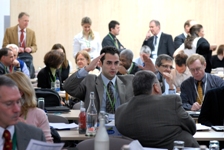The International Public Health Pesticides Workshop (IPHPW) held between 19-21 May 2009 in London aimed to identify new approaches, processes, and implementation strategies for the development and approval of new public health pest control tools.
As reported on this site (click here to view) over 100 participants from 22 countries, representing regulatory and other government agencies, public health authorities, the World Health Organization (WHO), the World Bank, the pest control industry and other technical experts gathered at the Charted Institute of Environmental Health (CIEH) in London.
|
In their post-event communiquá©, the organisers declared that the outcome of the workshop will complement on-going international public health efforts. Delegates agreed to work towards a better framework for conducting global joint reviews of new public health pesticide products. The workshop confirmed the need for harmonization of regulatory review processes and data requirements for public health pest control tools among the different schemes operating internationally. This would facilitate the development and approval of these tools. Participants identified the following next steps to advance the important work of increasing the availability of appropriate pesticides to improve public health around the world by:
Full details on the IPHPW website Further malaria developmentsVirtually coinciding with the workshop came announcements of two three-year pesticide development programmes with Syngenta and Bayer Crop Science funded by the Innovative Vector Control Consortium (IVCC). Both companies will be reviewing their back collections of chemicals for potential products. In addition, some weeks earlier (20 April 2009) Number 10 Downing Street was used as the backdrop for the UK launch of Malaria No More. Full details are in Issue 3 of Pest magazine – or can be read by clicking here. |
|






